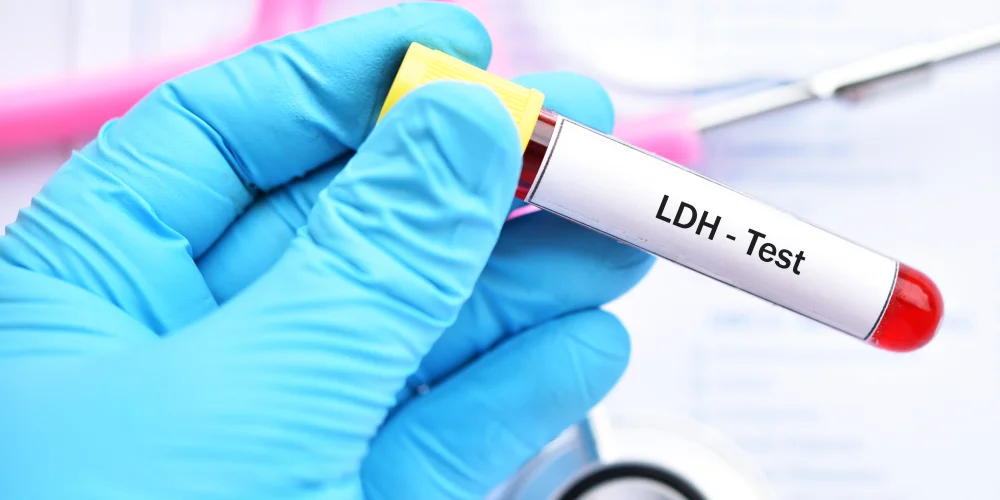LDH Test
Measuring Lactate Dehydrogenase Levels
It is the Lactate Dehydrogenase test is an important diagnostic tool that measures the amount of Lactate Dehydrogenase enzyme in blood. Lactate Dehydrogenase can be found in almost all body tissues, which includes the liver, heart muscles, kidneys as well as the brain and lung. It is a crucial component in converting glucose into fuel for cells. The elevated Lactate Dehydrogenase levels may be a sign of tissue damage or illness which makes this test useful in identifying and monitoring various medical diseases. It is the Lactate Dehydrogenase test is an important diagnostic tool that measures the amount of Lactate Dehydrogenase enzyme in blood. Lactate Dehydrogenase can be found in almost all body tissues, which includes the liver, heart muscles, kidneys as well as the brain and lung. It is a crucial component in converting glucose into fuel for cells. The elevated Lactate Dehydrogenase levels may be a sign of tissue damage or illness which makes this test useful in identifying and monitoring various medical diseases.

When is the LDH Test Prescribed?
LDH test is a diagnostic Lactate Dehydrogenase test is used in a variety of clinical situations:
- Heart Attack :- To help diagnose and monitor heart attacks, as Lactate Dehydrogenase levels can rise when heart tissue is damaged.
- Liver Diseases :- To detect and monitor liver diseases such as hepatitis, cirrhosis, and liver cancer.
- Muscle Disorders:- To diagnose muscle damage and diseases, including muscular dystrophy.
- Anemia and Blood Disorders :- To evaluate hemolytic anemia and other conditions that cause the breakdown of red blood cells.
- Cancer :- To monitor certain types of cancer and the effectiveness of treatment. Infections: To help diagnose and monitor severe infections and sepsis.
Preparation for the LDH Test
A minimum of preparation is needed to take preparation for the Lactate Dehydrogenase test. Patients are able to consume a healthy diet and drink water prior to the test. But, it is crucial to inform your doctor regarding any medication, supplements or illnesses that have recently occurred, since these influences can impact the results of the test.
Parameters Considered During LDH Test
The LDH test determines the level of enzyme activity, lactate dehydrogenase, in blood. A rise in Lactate Dehydrogenase levels could be a sign of tissue damage or disease within various organs. The test results are usually employed together with other diagnostic tests that provide complete evaluation of the health of a patient.
Time Required for LDH Test Report
A Lactate Dehydrogenase test can be a fast procedure. After taking the blood sample, the results are usually made delivered within the next day. This quick turnaround time allows healthcare professionals to evaluate the extent of tissue damage or disease and suggest appropriate treatment or further examination when needed.
LDH Test Price
The test is offered at Chirayu SuperSpeciality Hospital, the Lactate Dehydrogenase test price is Rs550. This option is cost-effective and provides access to the most crucial diagnostic tests to aid in early detection and efficient management of health issues.
Book an Appointment for LDH Test
Scheduling an appointment for your Lactate Dehydrogenase test at Chirayu Super Speciality Hospital is convenient and easy. You can make an appointment via our website or call our support team for assistance. Our team of experts at our pathology lab in Bhayandar is dedicated to providing fast and professional service to meet your medical requirements.
What Our Patients Say
Hear from our valued patients about their experiences at Chirayu Super Speciality Hospital and how our care has made a positive impact on their health and well-being.


Affordable and essential test for monitoring my muscle disorder.


The LDH test was crucial for diagnosing my anemia. Highly recommend.


Accurate results and professional care. Vital for my heart health monitoring.


Grateful for the thorough evaluation. Helped detect my condition early.


The LDH test helped diagnose my liver condition. Quick and reliable service.


Efficient service. The LDH test provided valuable insights into my health.
Frequently Asked Questions
Here, we provide answers to some of the most commonly asked questions to help you better understand our services, policies, and facilities. If you have any additional questions, please do not hesitate to contact us.
High LDH levels can indicate tissue damage or disease in the heart, liver, muscles, brain, kidneys, or lungs.
Yes, certain medications and supplements can influence LDH levels. Inform your healthcare provider about all medications you are taking.
No, fasting is generally not required unless specified by your healthcare provider.
The frequency of testing depends on your health condition and your healthcare provider’s recommendations.
Abnormal LDH levels may indicate underlying health issues. Further evaluation and treatment may be necessary based on your test results.